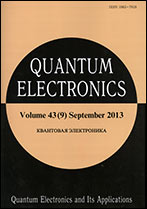|
This article is cited in 2 scientific papers (total in 2 papers)
Lasers
Efficiency of using nitrogen trifluoride as an oxidiser in a supersonic continuous-wave chemical HF laser
I. A. Fedorov
Russian Research Centre "Applied Chemistry", St.-Peterburg
Abstract:
We report the results of an experimental study of possible ways to increase the efficiency of using NF3 nitrogen trifluoride as an oxidiser in an atomic fluorine generator of a supersonic continuous-wave chemical HF laser with a flat nozzle block corresponding to the nozzle–nozzle reagent mixing scheme. As such ways, we consider increasing the residence time of reagents in the combustion chamber and rising temperature in the chemical reaction zone. Comparison of specific energy characteristics of an HF laser operating with the use of the studied (NF3) and 'basic' (F2) oxidisers shows that the replacement of molecular fluorine with nitrogen trifluoride during the burning with deuterium in the combustion chamber of an atomic fluorine generator with allowance for the proposed measures leads to a reduction in the specific laser energy output by no more than 23% – 24% at high burning completeness.
Keywords:
supersonic continuous-wave chemical HF laser, oxidiser, fluorine, nitrogen trifluoride, burning completeness, specific energy characteristics.
Received: 30.09.2019
Revised: 12.11.2019
Citation:
I. A. Fedorov, “Efficiency of using nitrogen trifluoride as an oxidiser in a supersonic continuous-wave chemical HF laser”, Kvantovaya Elektronika, 50:2 (2020), 157–161 [Quantum Electron., 50:2 (2020), 157–161]
Linking options:
https://www.mathnet.ru/eng/qe17190 https://www.mathnet.ru/eng/qe/v50/i2/p157
|


|





 Contact us:
Contact us: Terms of Use
Terms of Use
 Registration to the website
Registration to the website Logotypes
Logotypes









